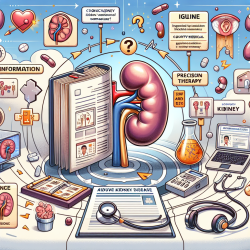Introduction
As a passionate advocate for data-driven decisions in speech-language pathology, I am always on the lookout for innovative research that can enhance our practice and improve outcomes for children. One such study that caught my attention is titled "Insights from Drug Checking Programs: Practicing Bootstrap Public Health Whilst Tailoring to Local Drug User Needs." While the focus of this research is on harm reduction and public health, the insights gleaned can be invaluable for practitioners in various fields, including speech-language pathology. This blog will explore how the outcomes of this research can be implemented to improve child therapy outcomes and encourage further research in this area.
Understanding the Research
The research conducted by Ondocsin et al. (2023) delves into the implementation of drug checking programs as a harm reduction strategy. Drug checking programs allow individuals to learn the composition of their substances before use, thereby preventing unintended overdoses. The study identifies several key themes, including the instability of drug markets, the need for adaptable services, the importance of training and capacity building, and the potential for integrating drug checking programs with other health services.
Key Takeaways for Speech-Language Pathologists
While the primary focus of the study is on drug checking programs, several insights can be translated into the field of speech-language pathology to improve outcomes for children:
- Adaptability and Responsiveness: Just as drug checking programs must adapt to rapidly changing drug markets, speech-language pathologists must be adaptable and responsive to the evolving needs of their clients. This means staying updated with the latest research, technologies, and therapeutic techniques to provide the best care possible.
- Training and Capacity Building: The research emphasizes the importance of ongoing training and capacity building to create sustainable programs. Similarly, speech-language pathologists should engage in continuous professional development to enhance their skills and knowledge. This can include attending workshops, conferences, and pursuing advanced certifications.
- Integration with Other Services: The potential for integrating drug checking programs with other health services highlights the importance of a holistic approach to care. Speech-language pathologists should collaborate with other healthcare providers, educators, and families to create comprehensive care plans that address the multifaceted needs of children.
Encouraging Further Research
The study by Ondocsin et al. (2023) underscores the need for further research to understand the full potential of drug checking programs. Similarly, in the field of speech-language pathology, there is a need for ongoing research to explore innovative approaches and interventions that can enhance therapy outcomes for children. Practitioners are encouraged to engage in research activities, collaborate with academic institutions, and contribute to the growing body of evidence-based practices.
Conclusion
The insights from the research on drug checking programs offer valuable lessons for speech-language pathologists. By embracing adaptability, prioritizing training and capacity building, and integrating services, practitioners can enhance their skills and create better outcomes for children. As we continue to learn from diverse fields and apply these lessons to our practice, we can make a meaningful impact on the lives of the children we serve.
To read the original research paper, please follow this link: Insights from Drug Checking Programs: Practicing Bootstrap Public Health Whilst Tailoring to Local Drug User Needs.










